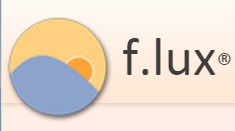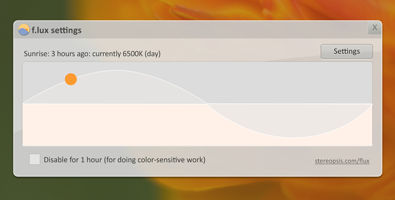| Fear And Loathing In the App Store 14 - Apple Rejects F.lux And It Isn't Even In The App Store! |
| Written by Lucy Black |
| Monday, 16 November 2015 |
|
I thought we had seen all the possibilities for troubles in the App Store, but this one reaches a new level of silliness. The app concerned wasn't even in the App Store, but Apple still managed to get it removed from "public" consumption.
f.lux produces software that changes the color temperature of your screen to take account of the time of day. The idea is that your circadian rhythms are keyed into the color of the daylight throughout the day - getting redder as the sun sets. The suggestion is that being exposed to the very blue light of computer screens is a reason that we don't get enough, or perhaps even the right type of, sleep. "f.lux fixes this: it makes the color of your computer's display adapt to the time of day, warm at night and like sunlight during the day. It's even possible that you're staying up too late because of your computer. You could use f.lux because it makes you sleep better, or you could just use it just because it makes your computer look better." If you would like a scientific view point then see: Bigger, Brighter, Bluer-Better? Current light-emitting devices – adverse sleep properties and preventative strategies The app is available for Windows, Mac and Linux and. until recently. for the iPhone/iPad and for free.
The problem is that the color adjustment needed to implement f.lux isn't a documented API. "f.lux cannot ship an iOS App using the Documented APIs, because the APIs we use are not there. In the last 5 years, we have had numerous conversations with Apple about our product and what would be required to make it work with iOS." Not being able to get their app into the App Store, the solution was to make use of Xcode 7's sideloading abilities. Users had to download Xcode 7, get a developer account and then follow the instructions to install f.lux. Apple didn't like it: "Apple has contacted us to say that the f.lux for iOS download (previously available on this page) is in violation of the Developer Program Agreement, so this method of install is no longer available." So basically Apple just said "your breaking the agreement" and left it as unspoken what would happen next. Presumably f.lux was pulled to avoid risking losing its Apple developer account. You need to remember that Apple not only controls what apps can be sold or given away, it also controls who has access to its programming tools. The real question is what value banning f.lux has to the end user or to Apple? The argument that Apple has to protect its end users is a bit thin, as an innocent end user isn't going to open a developer account and follow the complicated instructions. What is all the more ironic is that before Xcode 7 the app was available to install on jailbroken phones! Even so, there is a proven demand for the free app and it is a mystery why Apple would ban a useful app for what seem to be bureaucratic technicalities. As always, it is worth remembering that when you sign up to a controlled app store you are handing over the control of your product and your ability to innovate to a faceless entity without any real right of appeal - Kafka would love this. If you want to tell Apple how you feel, feedback to Apple can be written here.
More Informationf.lux is no longer available here Fear and Loathing In The App Store
Epic Games CEO Finally Notices That UWP Apps Are A Walled Garden To be informed about new articles on I Programmer, sign up for our weekly newsletter, subscribe to the RSS feed and follow us on, Twitter, Facebook, Google+ or Linkedin.
Comments
or email your comment to: comments@i-programmer.info
|
| Last Updated ( Wednesday, 20 January 2016 ) |



